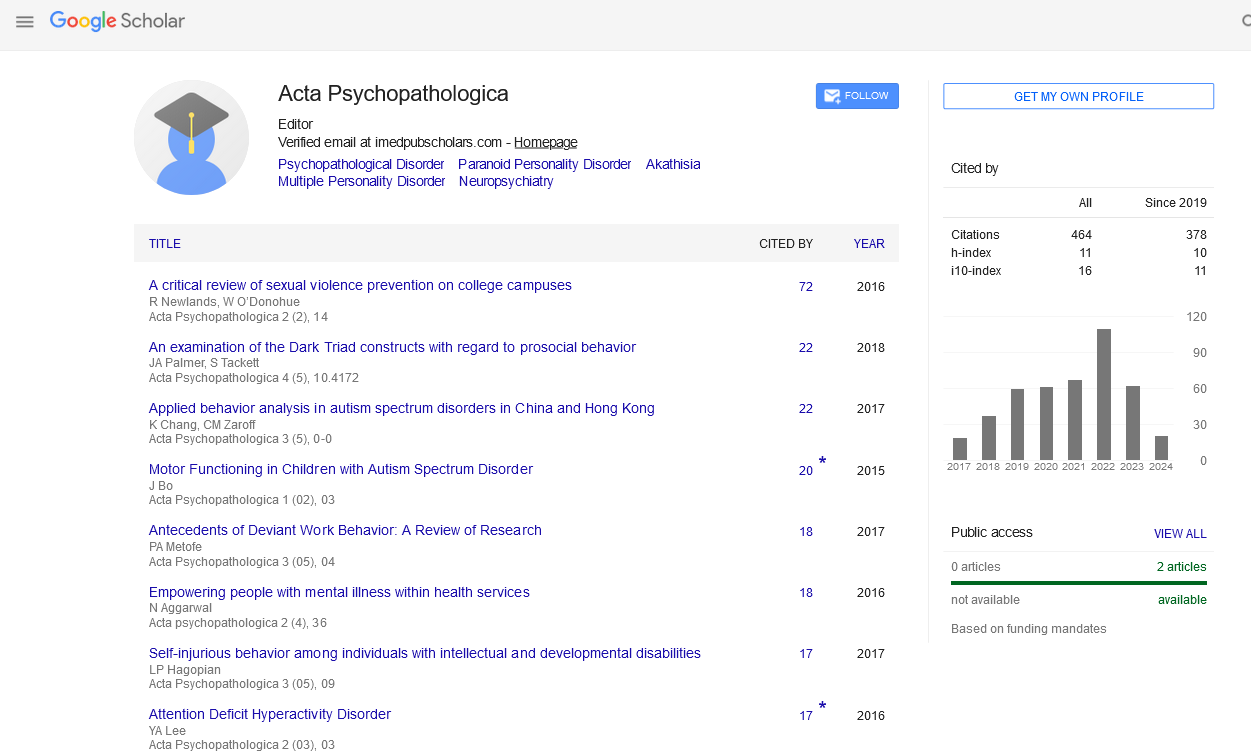Indexed In
- China National Knowledge Infrastructure (CNKI)
- CiteFactor
- Electronic Journals Library
- Directory of Research Journal Indexing (DRJI)
- OCLC- WorldCat
- Publons
- Geneva Foundation for Medical Education and Research
- Google Scholar
- SHERPA ROMEO
- Secret Search Engine Labs
- Serials Union Catalogue (SUNCAT)
Useful Links
Share This Page
Journal Flyer

Open Access Journals
- Agri and Aquaculture
- Biochemistry
- Bioinformatics & Systems Biology
- Business & Management
- Chemistry
- Clinical Sciences
- Engineering
- Food & Nutrition
- General Science
- Genetics & Molecular Biology
- Immunology & Microbiology
- Medical Sciences
- Neuroscience & Psychology
- Nursing & Health Care
- Pharmaceutical Sciences
Short Communication - (2024) Volume 10, Issue 5
Simulating Rumination's Influence on Bias in Evaluating Parapsychology and Neuroscience Studies Using ACT-R
Received: 01-May-2024, Manuscript No. IPAP-24-20473; Editor assigned: 03-May-2024, Pre QC No. IPAP-24-20473 (PQ); Reviewed: 17-May-2024, QC No. IPAP-24-20473; Revised: 22-May-2024, Manuscript No. IPAP-24-20473 (R); Published: 29-May-2024, DOI: 10.36648/2469-6676-10.05.46
Introduction
Rumination, the repetitive and passive focus on distressing thoughts or feelings, significantly affects cognitive processes, particularly memory recall. Understanding the mechanisms behind this can offer insights into cognitive vulnerabilities associated with mood disorders like depression and anxiety. One effective approach to studying rumination’s impact on memory recall is through computational modeling, specifically using the Adaptive Control of Thought Rational (ACT-R) framework. ACT-R is a cognitive architecture that simulates human cognitive processes, providing a powerful tool for investigating the intricate dynamics of memory and rumination.
Description
ACT-R models cognition by dividing the mind into modules, each responsible for different cognitive functions, such as memory, attention, and problem-solving. These modules interact through a central production system that coordinates cognitive activities. In modeling the effects of rumination on free recall, the focus is on the declarative memory module, which handles the storage and retrieval of factual information and past experiences, and the production system that governs the sequence of cognitive operations. In the context of free recall, individuals are typically asked to remember and report items from a previously studied list in any order. Rumination can disrupt this process by occupying cognitive resources and altering the accessibility of stored memories. To model this in ACT-R, we simulate the cognitive processes during rumination and its interference with memory retrieval. The first step is to encode the studied items into declarative memory. In ACT-R, each item is represented as a chunk with varying activation levels, determined by factors such as recency and frequency of access. During free recall, items with higher activation levels are more likely to be retrieved. Rumination can be modelled as an intrusive thought process that repeatedly activates distressrelated chunks, thereby drawing cognitive resources away from the target recall task. To simulate rumination, we introduce a set of production rules in the ACT-R model that mimic the repetitive and intrusive nature of ruminative thoughts. These rules trigger the activation of rumination-related chunks, which compete with the target items for retrieval. This competition reduces the activation levels of the target chunks, making them less accessible for recall. Additionally, the production rules can simulate the cognitive load imposed by rumination. This is achieved by incorporating a parameter that represents the cognitive resources consumed by ruminative thoughts. When this parameter is high, it indicates that a significant portion of cognitive resources is occupied by rumination, leaving fewer resources available for the recall task. This can be represented in the model by increasing the latency of memory retrieval operations, thus reflecting the slowed cognitive processing observed in individuals who ruminate. Furthermore, the impact of rumination on the context representation in ACT-R can be modelled. Context representation in ACT-R influences which chunks are retrieved by associating them with specific contextual cues. Rumination can alter this representation by introducing intrusive contextual cues associated with distressing thoughts, thereby disrupting the retrieval process. The model can simulate this by modifying the contextual associations of memory chunks, making it more likely for rumination-related chunks to be retrieved instead of the target items. Through these modifications, the ACT-R model can simulate the detrimental effects of rumination on free recall. It can illustrate how ruminative thoughts interfere with the accessibility of target memories and increase retrieval latency. The model can also predict specific patterns of recall performance, such as reduced overall recall, increased intrusion errors (recalling irrelevant or distress-related items), and slower retrieval times [1-4].
Conclusion
Ultimately, navigating the fear of AI requires a balanced approach that acknowledges both the opportunities and challenges presented by AI technology. By proactively addressing concerns, promoting ethical practices, and fostering education and dialogue, we can harness the potential of AI to benefit society while mitigating the risks and uncertainties that contribute to fear and apprehension.
Acknowledgement
None.
Conflict Of Interest
The authors declare that they have no conflict of interest.
References
- Monnet-Corti V, Antezack A, Pignoly M (2018) How to perfect the aesthetics of your smile: Always in pink! Orthod Fr. 89:71-80.
- Alikhasi M, Yousefi P, Afrashtehfar KI (2022) Smile design. Dent Clin North Am 66:477-487.
- Pethani F (2021) Promises and perils of artificial intelligence in dentistry. Aust Dent J 66:124-135.
- Meng X, Xu S, Zhang J (2022) How does industrial intelligence affect carbon intensity in China? Empirical analysis based on Chinese provincial panel data. J Clean Prod 376:134273.
Citation: Dubois Y (2024) Simulating Rumination's Influence on Bias in Evaluating Parapsychology and Neuroscience Studies using ACT-R. 10:46.
Copyright: © 2024 Mounsey S. This is an open-access article distributed under the terms of the Creative Commons Attribution License, which permits unrestricted use, distribution, and reproduction in any medium, provided the original author and SOURCE are credited

